Ageing and Memory: Exploring Positive Memory Bias in Older Adults
VerifiedAdded on 2023/06/04
|5
|1267
|114
Essay
AI Summary
This essay delves into the psychological aspects of ageing and memory, focusing on the phenomenon of positive memory bias in older adults. It examines how older adults tend to recall more positive memories compared to younger individuals, exploring the cognitive and emotional factors that contribute to this bias. The essay discusses the role of emotional self-regulation, episodic memory, and the influence of mood on memory recall. It also considers the impact of social factors and individual perspectives on memory recollection. The study references several research papers to support its arguments, ultimately concluding that the selective remembrance of positive memories plays a significant role in the overall well-being of older adults. The essay also touches upon the differences in memory recall between younger and older generations and the implications of these differences.
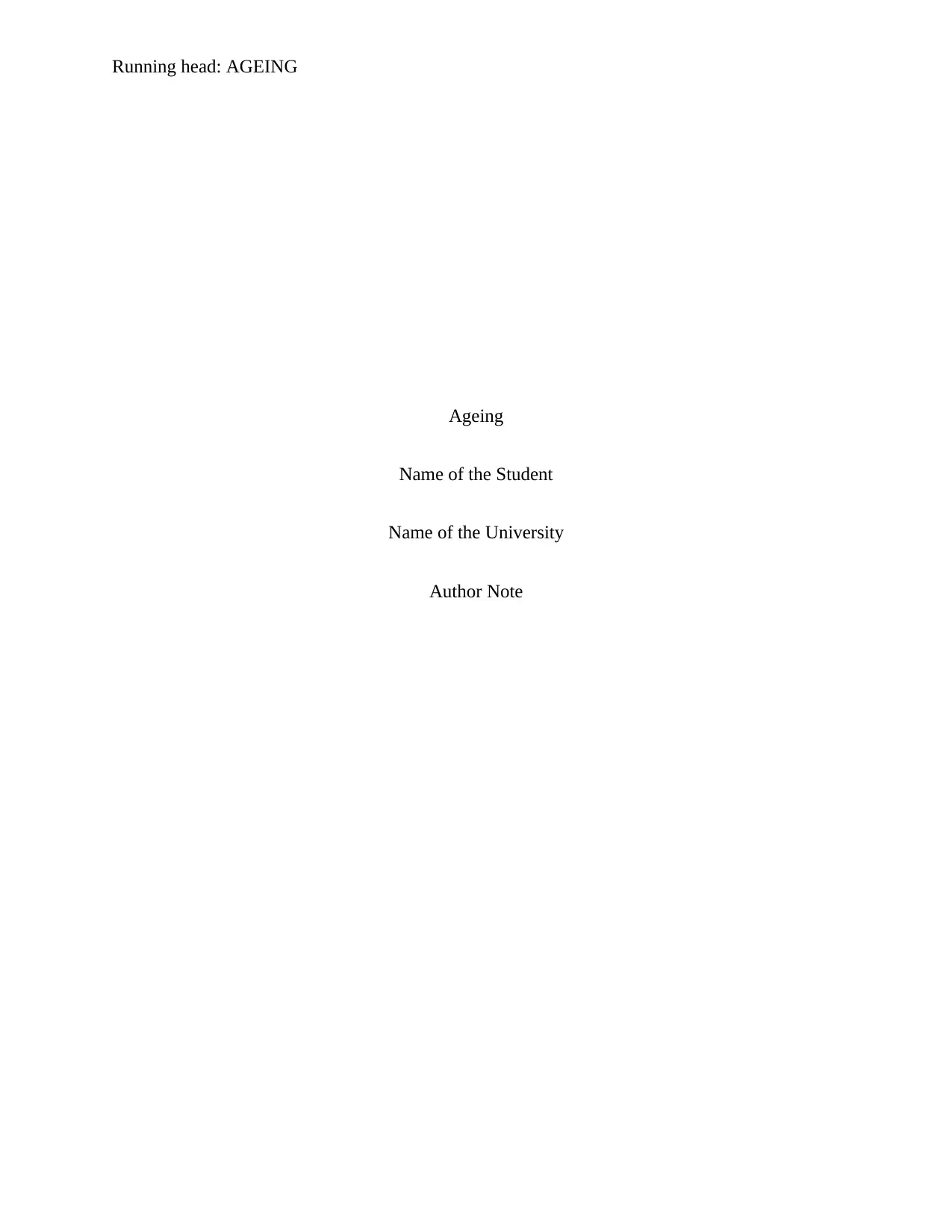
Running head: AGEING
Ageing
Name of the Student
Name of the University
Author Note
Ageing
Name of the Student
Name of the University
Author Note
Paraphrase This Document
Need a fresh take? Get an instant paraphrase of this document with our AI Paraphraser
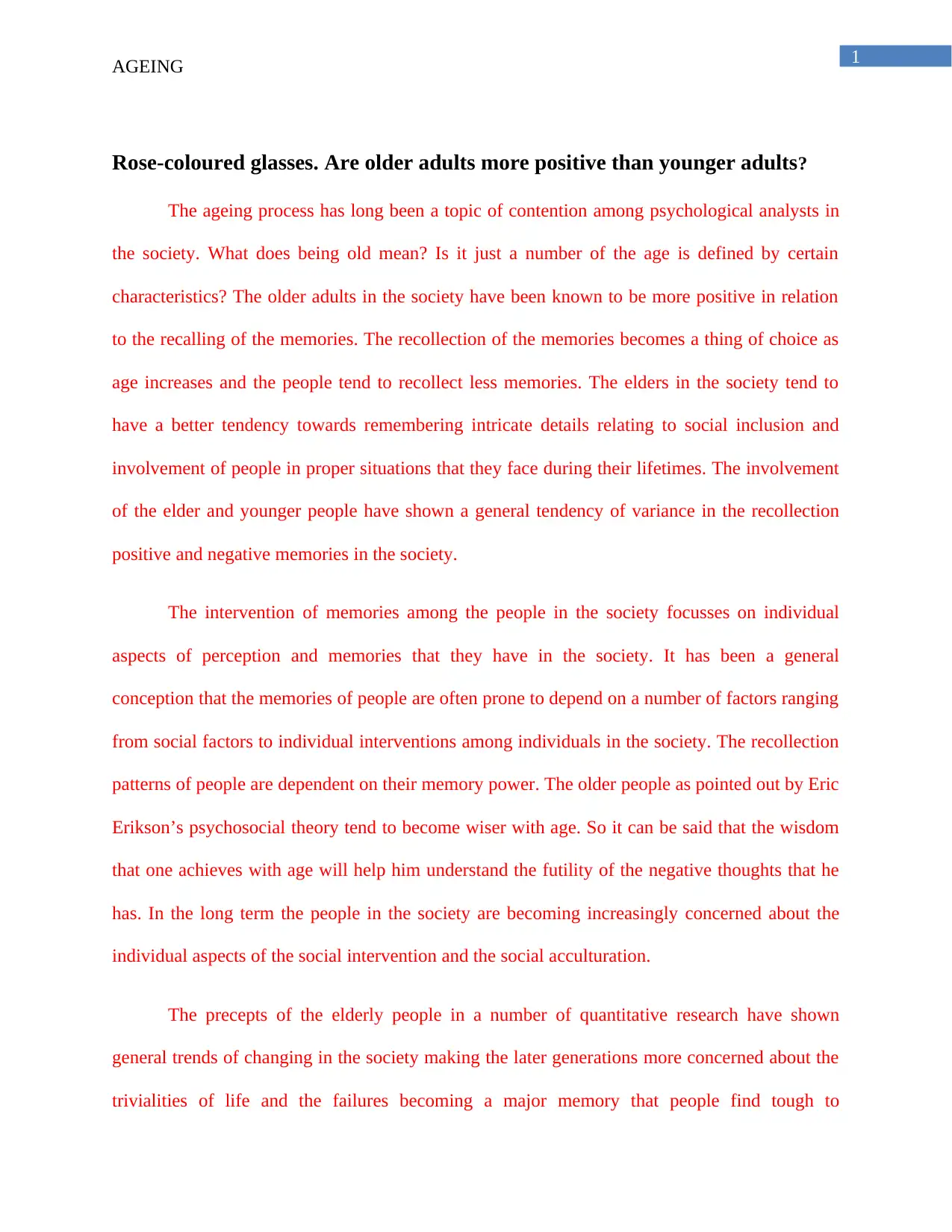
1
AGEING
Rose-coloured glasses. Are older adults more positive than younger adults?
The ageing process has long been a topic of contention among psychological analysts in
the society. What does being old mean? Is it just a number of the age is defined by certain
characteristics? The older adults in the society have been known to be more positive in relation
to the recalling of the memories. The recollection of the memories becomes a thing of choice as
age increases and the people tend to recollect less memories. The elders in the society tend to
have a better tendency towards remembering intricate details relating to social inclusion and
involvement of people in proper situations that they face during their lifetimes. The involvement
of the elder and younger people have shown a general tendency of variance in the recollection
positive and negative memories in the society.
The intervention of memories among the people in the society focusses on individual
aspects of perception and memories that they have in the society. It has been a general
conception that the memories of people are often prone to depend on a number of factors ranging
from social factors to individual interventions among individuals in the society. The recollection
patterns of people are dependent on their memory power. The older people as pointed out by Eric
Erikson’s psychosocial theory tend to become wiser with age. So it can be said that the wisdom
that one achieves with age will help him understand the futility of the negative thoughts that he
has. In the long term the people in the society are becoming increasingly concerned about the
individual aspects of the social intervention and the social acculturation.
The precepts of the elderly people in a number of quantitative research have shown
general trends of changing in the society making the later generations more concerned about the
trivialities of life and the failures becoming a major memory that people find tough to
AGEING
Rose-coloured glasses. Are older adults more positive than younger adults?
The ageing process has long been a topic of contention among psychological analysts in
the society. What does being old mean? Is it just a number of the age is defined by certain
characteristics? The older adults in the society have been known to be more positive in relation
to the recalling of the memories. The recollection of the memories becomes a thing of choice as
age increases and the people tend to recollect less memories. The elders in the society tend to
have a better tendency towards remembering intricate details relating to social inclusion and
involvement of people in proper situations that they face during their lifetimes. The involvement
of the elder and younger people have shown a general tendency of variance in the recollection
positive and negative memories in the society.
The intervention of memories among the people in the society focusses on individual
aspects of perception and memories that they have in the society. It has been a general
conception that the memories of people are often prone to depend on a number of factors ranging
from social factors to individual interventions among individuals in the society. The recollection
patterns of people are dependent on their memory power. The older people as pointed out by Eric
Erikson’s psychosocial theory tend to become wiser with age. So it can be said that the wisdom
that one achieves with age will help him understand the futility of the negative thoughts that he
has. In the long term the people in the society are becoming increasingly concerned about the
individual aspects of the social intervention and the social acculturation.
The precepts of the elderly people in a number of quantitative research have shown
general trends of changing in the society making the later generations more concerned about the
trivialities of life and the failures becoming a major memory that people find tough to
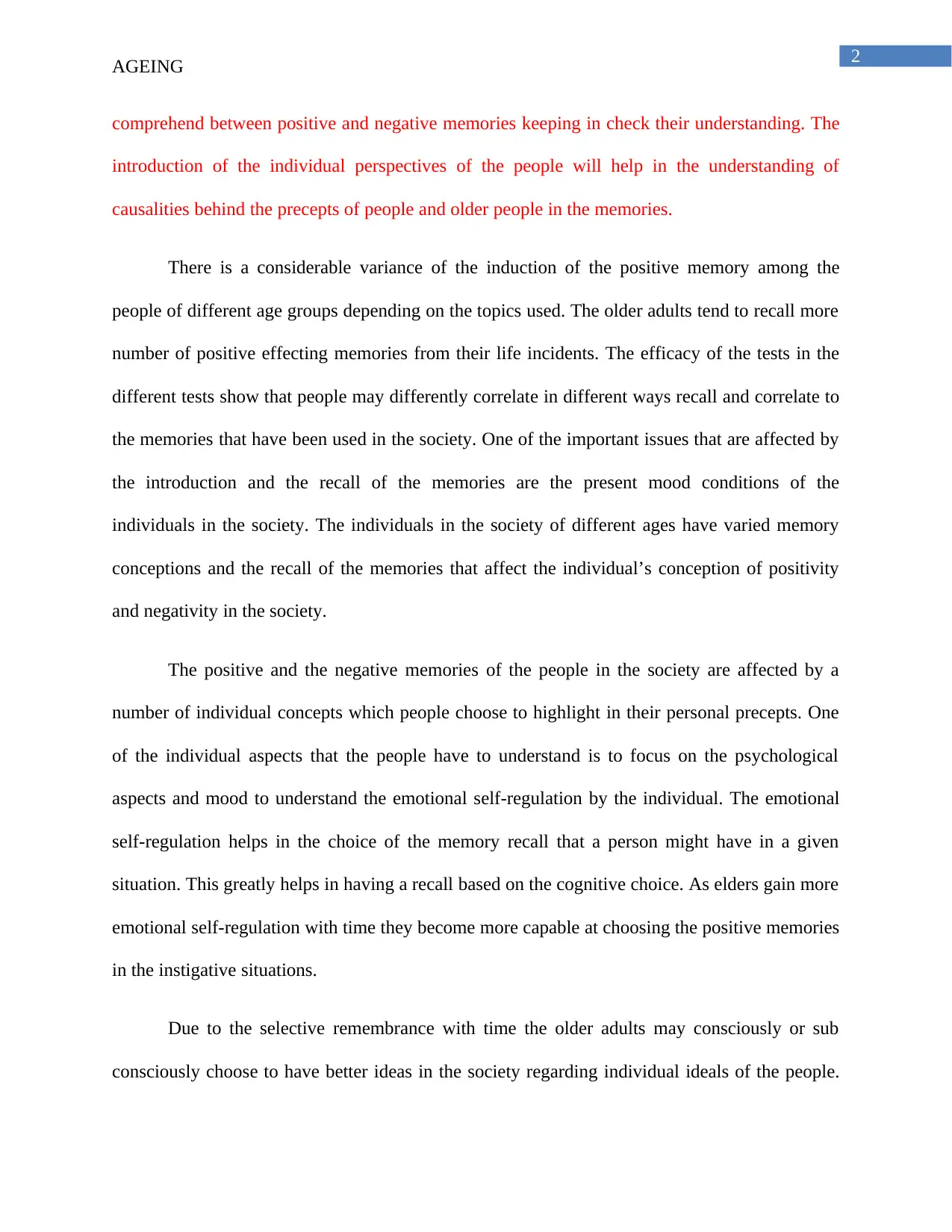
2
AGEING
comprehend between positive and negative memories keeping in check their understanding. The
introduction of the individual perspectives of the people will help in the understanding of
causalities behind the precepts of people and older people in the memories.
There is a considerable variance of the induction of the positive memory among the
people of different age groups depending on the topics used. The older adults tend to recall more
number of positive effecting memories from their life incidents. The efficacy of the tests in the
different tests show that people may differently correlate in different ways recall and correlate to
the memories that have been used in the society. One of the important issues that are affected by
the introduction and the recall of the memories are the present mood conditions of the
individuals in the society. The individuals in the society of different ages have varied memory
conceptions and the recall of the memories that affect the individual’s conception of positivity
and negativity in the society.
The positive and the negative memories of the people in the society are affected by a
number of individual concepts which people choose to highlight in their personal precepts. One
of the individual aspects that the people have to understand is to focus on the psychological
aspects and mood to understand the emotional self-regulation by the individual. The emotional
self-regulation helps in the choice of the memory recall that a person might have in a given
situation. This greatly helps in having a recall based on the cognitive choice. As elders gain more
emotional self-regulation with time they become more capable at choosing the positive memories
in the instigative situations.
Due to the selective remembrance with time the older adults may consciously or sub
consciously choose to have better ideas in the society regarding individual ideals of the people.
AGEING
comprehend between positive and negative memories keeping in check their understanding. The
introduction of the individual perspectives of the people will help in the understanding of
causalities behind the precepts of people and older people in the memories.
There is a considerable variance of the induction of the positive memory among the
people of different age groups depending on the topics used. The older adults tend to recall more
number of positive effecting memories from their life incidents. The efficacy of the tests in the
different tests show that people may differently correlate in different ways recall and correlate to
the memories that have been used in the society. One of the important issues that are affected by
the introduction and the recall of the memories are the present mood conditions of the
individuals in the society. The individuals in the society of different ages have varied memory
conceptions and the recall of the memories that affect the individual’s conception of positivity
and negativity in the society.
The positive and the negative memories of the people in the society are affected by a
number of individual concepts which people choose to highlight in their personal precepts. One
of the individual aspects that the people have to understand is to focus on the psychological
aspects and mood to understand the emotional self-regulation by the individual. The emotional
self-regulation helps in the choice of the memory recall that a person might have in a given
situation. This greatly helps in having a recall based on the cognitive choice. As elders gain more
emotional self-regulation with time they become more capable at choosing the positive memories
in the instigative situations.
Due to the selective remembrance with time the older adults may consciously or sub
consciously choose to have better ideas in the society regarding individual ideals of the people.
⊘ This is a preview!⊘
Do you want full access?
Subscribe today to unlock all pages.

Trusted by 1+ million students worldwide
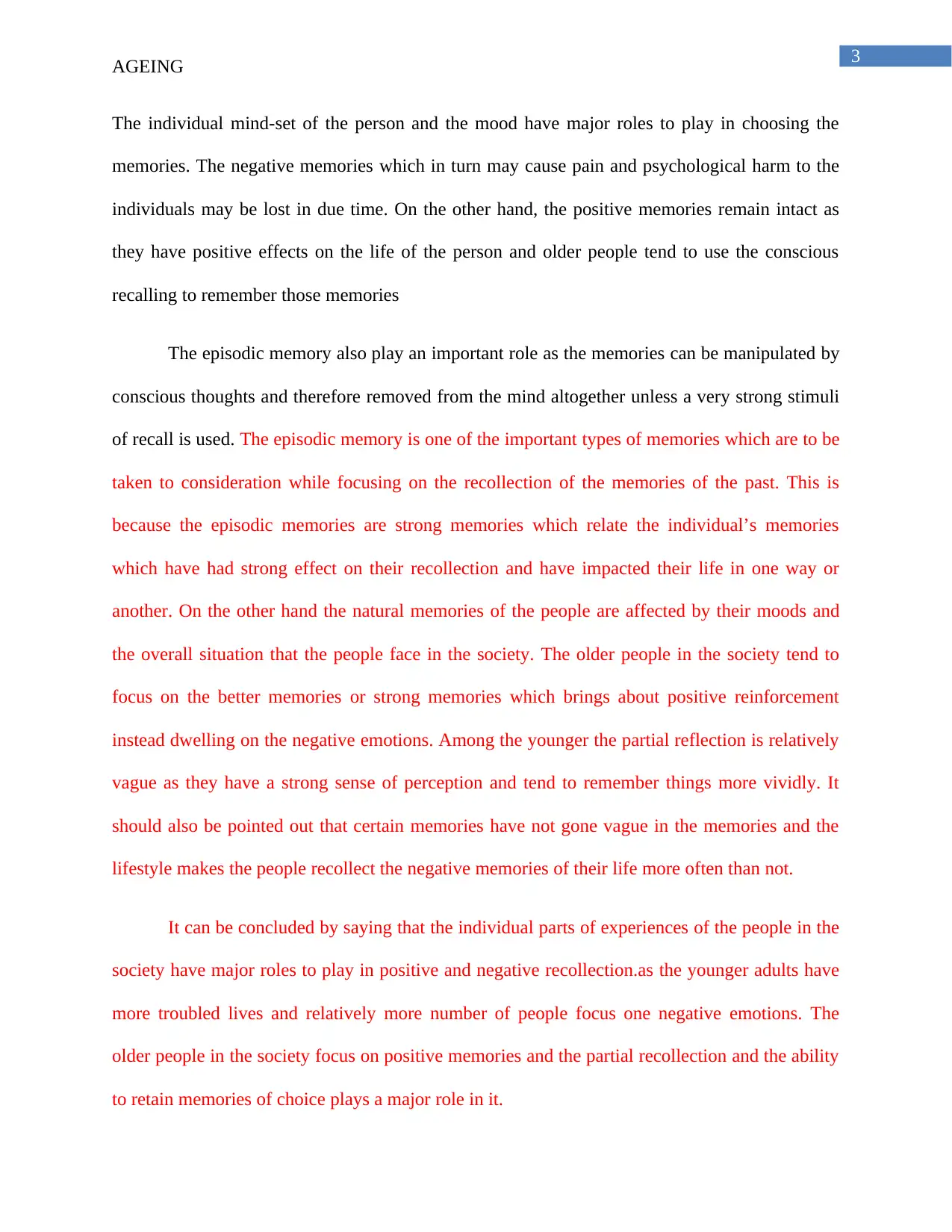
3
AGEING
The individual mind-set of the person and the mood have major roles to play in choosing the
memories. The negative memories which in turn may cause pain and psychological harm to the
individuals may be lost in due time. On the other hand, the positive memories remain intact as
they have positive effects on the life of the person and older people tend to use the conscious
recalling to remember those memories
The episodic memory also play an important role as the memories can be manipulated by
conscious thoughts and therefore removed from the mind altogether unless a very strong stimuli
of recall is used. The episodic memory is one of the important types of memories which are to be
taken to consideration while focusing on the recollection of the memories of the past. This is
because the episodic memories are strong memories which relate the individual’s memories
which have had strong effect on their recollection and have impacted their life in one way or
another. On the other hand the natural memories of the people are affected by their moods and
the overall situation that the people face in the society. The older people in the society tend to
focus on the better memories or strong memories which brings about positive reinforcement
instead dwelling on the negative emotions. Among the younger the partial reflection is relatively
vague as they have a strong sense of perception and tend to remember things more vividly. It
should also be pointed out that certain memories have not gone vague in the memories and the
lifestyle makes the people recollect the negative memories of their life more often than not.
It can be concluded by saying that the individual parts of experiences of the people in the
society have major roles to play in positive and negative recollection.as the younger adults have
more troubled lives and relatively more number of people focus one negative emotions. The
older people in the society focus on positive memories and the partial recollection and the ability
to retain memories of choice plays a major role in it.
AGEING
The individual mind-set of the person and the mood have major roles to play in choosing the
memories. The negative memories which in turn may cause pain and psychological harm to the
individuals may be lost in due time. On the other hand, the positive memories remain intact as
they have positive effects on the life of the person and older people tend to use the conscious
recalling to remember those memories
The episodic memory also play an important role as the memories can be manipulated by
conscious thoughts and therefore removed from the mind altogether unless a very strong stimuli
of recall is used. The episodic memory is one of the important types of memories which are to be
taken to consideration while focusing on the recollection of the memories of the past. This is
because the episodic memories are strong memories which relate the individual’s memories
which have had strong effect on their recollection and have impacted their life in one way or
another. On the other hand the natural memories of the people are affected by their moods and
the overall situation that the people face in the society. The older people in the society tend to
focus on the better memories or strong memories which brings about positive reinforcement
instead dwelling on the negative emotions. Among the younger the partial reflection is relatively
vague as they have a strong sense of perception and tend to remember things more vividly. It
should also be pointed out that certain memories have not gone vague in the memories and the
lifestyle makes the people recollect the negative memories of their life more often than not.
It can be concluded by saying that the individual parts of experiences of the people in the
society have major roles to play in positive and negative recollection.as the younger adults have
more troubled lives and relatively more number of people focus one negative emotions. The
older people in the society focus on positive memories and the partial recollection and the ability
to retain memories of choice plays a major role in it.
Paraphrase This Document
Need a fresh take? Get an instant paraphrase of this document with our AI Paraphraser
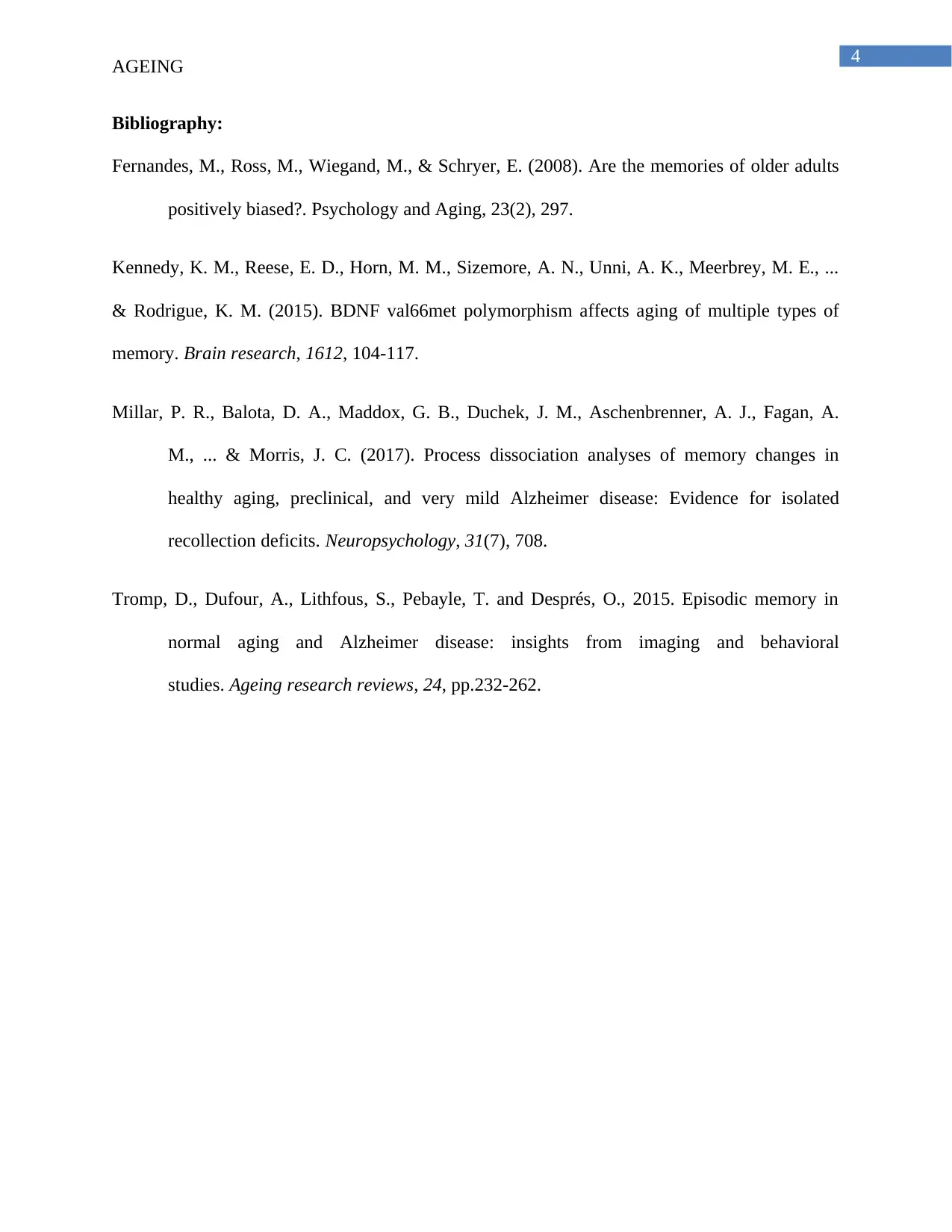
4
AGEING
Bibliography:
Fernandes, M., Ross, M., Wiegand, M., & Schryer, E. (2008). Are the memories of older adults
positively biased?. Psychology and Aging, 23(2), 297.
Kennedy, K. M., Reese, E. D., Horn, M. M., Sizemore, A. N., Unni, A. K., Meerbrey, M. E., ...
& Rodrigue, K. M. (2015). BDNF val66met polymorphism affects aging of multiple types of
memory. Brain research, 1612, 104-117.
Millar, P. R., Balota, D. A., Maddox, G. B., Duchek, J. M., Aschenbrenner, A. J., Fagan, A.
M., ... & Morris, J. C. (2017). Process dissociation analyses of memory changes in
healthy aging, preclinical, and very mild Alzheimer disease: Evidence for isolated
recollection deficits. Neuropsychology, 31(7), 708.
Tromp, D., Dufour, A., Lithfous, S., Pebayle, T. and Després, O., 2015. Episodic memory in
normal aging and Alzheimer disease: insights from imaging and behavioral
studies. Ageing research reviews, 24, pp.232-262.
AGEING
Bibliography:
Fernandes, M., Ross, M., Wiegand, M., & Schryer, E. (2008). Are the memories of older adults
positively biased?. Psychology and Aging, 23(2), 297.
Kennedy, K. M., Reese, E. D., Horn, M. M., Sizemore, A. N., Unni, A. K., Meerbrey, M. E., ...
& Rodrigue, K. M. (2015). BDNF val66met polymorphism affects aging of multiple types of
memory. Brain research, 1612, 104-117.
Millar, P. R., Balota, D. A., Maddox, G. B., Duchek, J. M., Aschenbrenner, A. J., Fagan, A.
M., ... & Morris, J. C. (2017). Process dissociation analyses of memory changes in
healthy aging, preclinical, and very mild Alzheimer disease: Evidence for isolated
recollection deficits. Neuropsychology, 31(7), 708.
Tromp, D., Dufour, A., Lithfous, S., Pebayle, T. and Després, O., 2015. Episodic memory in
normal aging and Alzheimer disease: insights from imaging and behavioral
studies. Ageing research reviews, 24, pp.232-262.
1 out of 5
Related Documents
Your All-in-One AI-Powered Toolkit for Academic Success.
+13062052269
info@desklib.com
Available 24*7 on WhatsApp / Email
![[object Object]](/_next/static/media/star-bottom.7253800d.svg)
Unlock your academic potential
Copyright © 2020–2025 A2Z Services. All Rights Reserved. Developed and managed by ZUCOL.





